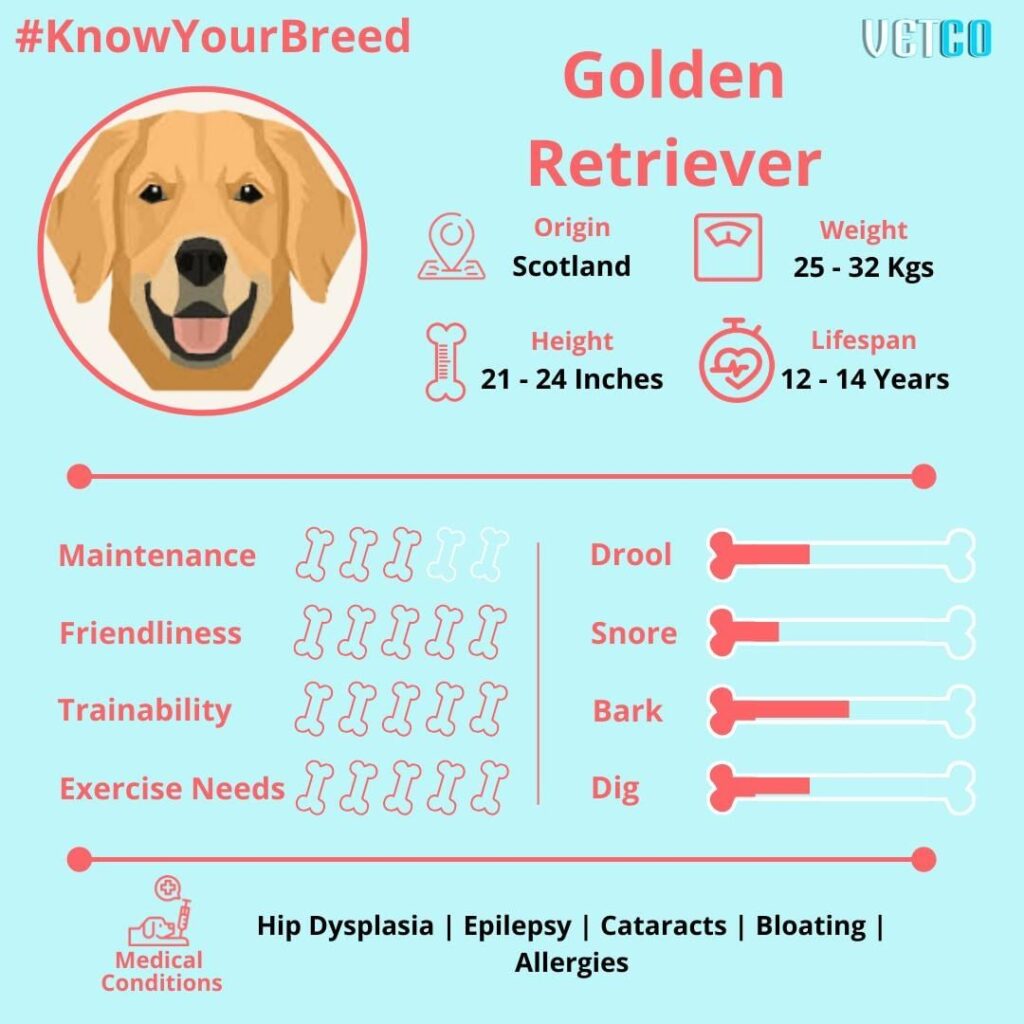Golden Retrievers are among the most beloved and popular dog breeds in the world, known for their friendly demeanor, intelligence, and loyalty. If you’re considering adding a Golden Retriever to your family or if you already have one, understanding their unique characteristics, needs, and quirks is essential for providing them with the best possible care and companionship.
History and Origins
The story of the Golden Retriever begins in the Scottish Highlands during the mid-19th century. They were developed by crossing various breeds like the Yellow Retriever, Tweed Water Spaniel, Irish Setter, and Bloodhound to create the ultimate hunting companion. Golden Retrievers were prized for their ability to retrieve shot game from both water and land, thanks to their soft mouths and excellent swimming skills.
Temperament and Personality
Golden Retrievers are renowned for their friendly, gentle, and tolerant nature. They typically have an outgoing personality and are eager to please, making them excellent family pets and companions for people of all ages. Their affable disposition also extends to other animals, as they often get along well with other dogs and pets. However, their friendly nature means they are not typically suited to being guard dogs, as they’re more likely to greet intruders with a wagging tail than with aggression.
Physical Characteristics
Golden Retrievers are medium to large-sized dogs with a sturdy and well-proportioned build. They have a dense, water-repellent double coat that can range in color from light cream to deep golden. Their expressive eyes convey warmth and intelligence, while their signature “golden” coat gives them a majestic appearance. Adult males typically stand between 22-24 inches tall at the shoulder and weigh between 65-75 pounds, while females are slightly smaller, standing 20-22 inches tall and weighing 55-65 pounds.
Exercise and Activity
Golden Retrievers are active, energetic dogs that require regular exercise to keep them happy and healthy. They thrive on outdoor activities such as walks, hikes, and games of fetch, and they particularly love swimming thanks to their water-resistant coat and webbed feet. Daily exercise is essential to prevent boredom and to help them burn off excess energy. Mental stimulation is also important for Golden Retrievers, so incorporating training sessions, puzzle toys, and interactive games into their routine can help keep their minds sharp.
Training and Socialization
Golden Retrievers are highly intelligent and trainable dogs that excel in obedience and agility training. They are eager to please their owners and respond well to positive reinforcement techniques such as praise, treats, and play. Early socialization is crucial to help them develop into well-rounded adults, so expose them to a variety of people, animals, sights, and sounds from a young age. This will help prevent shyness or fearfulness and ensure they grow up to be confident and friendly dogs.
Grooming Needs
While Golden Retrievers have a stunning coat, it does require regular grooming to keep it looking its best. They are moderate shedders year-round and undergo heavier shedding twice a year in the spring and fall. To keep their coat in top condition, brush them several times a week to remove loose fur and prevent mats or tangles. Regular baths with a mild dog shampoo can help keep their coat clean and smelling fresh, but be careful not to over-bathe them, as this can strip their coat of its natural oils. Additionally, check their ears regularly for signs of infection, trim their nails as needed, and brush their teeth regularly to maintain their overall health and hygiene.
Health Considerations
While Golden Retrievers are generally healthy dogs, they are prone to certain genetic health conditions that prospective owners should be aware of. These can include hip dysplasia, elbow dysplasia, progressive retinal atrophy (PRA), and certain types of cancer. Responsible breeding practices, regular veterinary check-ups, and a healthy lifestyle can help reduce the risk of these conditions and ensure your Golden Retriever enjoys a long and happy life.
Nutritional Needs
Feeding your Golden Retriever a balanced and nutritious diet is crucial for their overall health and well-being. Choose a high-quality dog food that is appropriate for their age, size, and activity level, and avoid overfeeding to prevent obesity. Treats should be given in moderation and used as rewards during training sessions. It’s also important to provide them with fresh water at all times to keep them hydrated, especially during periods of physical activity.
Golden Retrievers are truly special dogs that bring joy, love, and companionship to countless families around the world. Their friendly nature, intelligence, and versatility make them wonderful pets for people of all ages and lifestyles. By understanding their unique characteristics, needs, and care requirements, you can ensure that your Golden Retriever lives a happy, healthy, and fulfilling life as a cherished member of your family.











